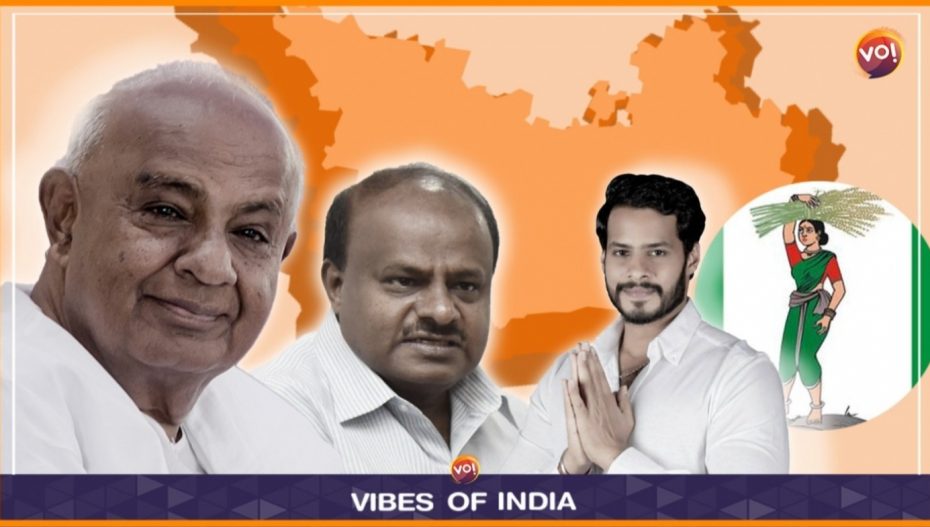Karnataka has played a crucial role in the country’s politics. In the past few decades, the state has seen the emergence of a regional party, the Janata Dal (Secular) or JD(S), that has made a significant impact on the state’s political landscape. The party has been successful in winning a significant number of seats in the state assembly elections, making it a key player in the formation of the government.
The JD(S) was formed in 1999 by former Prime Minister H.D. Deve Gowda, who was also the Chief Minister of Karnataka. The party has been associated with the leadership of Deve Gowda, who served as the Prime Minister of India from June 1996 to April 1997. Deve Gowda has been a prominent figure in Karnataka’s politics for several decades. He joined the Congress at the age of 20 in 1953 and later left the party to join the Janata Party. He then formed the Janata Dal (Secular) in 1999.
The JD(S) has been successful in Karnataka’s politics due to its unique features and strategies. One of the reasons for the party’s success is its focus on the rural population and farmers. The party has been successful in addressing many of the state’s problems, including the Hubbli ground issue, which had created a political controversy involving the local minority community. Deve Gowda was successful in finding a peaceful resolution to this issue.
The party has also been successful in forming alliances with other political parties. In the 2004 state assembly elections, the party saw a significant increase in its tally, reaching 58 seats and thereby increasing its influence. In that election, the BJP won 79 seats, and the Congress won 65 seats. JD(S) became the kingmaker for the first time. The Congress formed the government with the support of JD(S).
However, the JD(S) has also faced several challenges in its political journey. The party has been successful in winning seats in the state assembly elections, but it has failed to expand its presence beyond the southern districts of Karnataka. In the 2018 state assembly elections, the party fought elections on 200 seats but could only win 37 seats.
The reason for this is that JD(S) is a highly restricted party in South Karnataka, also known as Old Mysore, and includes Hassan, Mandya, Ramanagara, Tumkur, Mysore, and other southern districts. In this state, where the legal community holds a majority, there are 64 legislative assembly meetings. The Devegowda family holds a significant influence behind this community. Hassan district is the birthplace of the Devegowda family. From here, Devegowda started contesting elections from the Holenarasipur assembly constituency in the early 1960s.
The JD(S) has been successful in forming governments in the past, and it has the potential to do so again in the future. In the 2018 state assembly elections, the Congress won 116 seats, while the BJP won 72 seats. The JD(S) won 28 seats. In such a scenario, if even a few seats are up for grabs, it could lead to a hung assembly. In that case, the third front could be formed in the Karnataka Assembly. Because, apart from getting support from JD(S), neither BJP nor Congress has any other alternative to form the government. If it comes to the third position, JD(S) has already formed the government three times before. The party has become the kingmaker again, and all eyes are on JD(S) to see what role it will play in the formation.
In 1991, Gowda’s son, H.D. Kumaraswamy, played a key role in bringing the issues of farmers to the forefront in Parliament, especially those of his home state. He raised the concerns of farmers in Parliament and played an important role in advocating for their interests. He went on to become the head of the Janata Party in his state twice, in 1991 and 1994. In 1994, the Janata Party came to power in the state with Gowda as its main strength. They elected their leader to the position of Chief Minister of Karnataka on December 11, 1994. Later, they won a majority in the Ramanagara Legislative Assembly by-election.
In 1994, Deve Gowda successfully brought the Janata Dal to power in Karnataka for the first time. After that, they also advanced in national politics. In the 1996 Lok Sabha elections, the Congress only won 140 seats, while the Janata Dal won 46 seats. The Janata Dal, Socialist Party, and 13 other parties formed a united front. Deve Gowda was made the Prime Minister. On May 30, 1996, he took the oath as India’s 11th Prime Minister after resigning as Chief Minister of Karnataka. The Janata Dal then split into various smaller factions. In 1999, Deve Gowda established the Janata Dal (Secular). This party has maintained its influence in Karnataka.
Due to their extensive experience in active politics, they were successful in addressing many of the state’s problems. They demonstrated their political skills by finding a solution to the Hubbli ground issue, which had created a political controversy involving the local minority community. Gauda was successful in finding a peaceful resolution to this issue.
The JDS has been the third-largest party in the state assembly elections since the last three terms (counted as four from 2023). Currently, they continue to play a role in the formation of the government. This is because neither the BJP nor Congress can get a clear majority from the total seats, and the JDS is necessary for the formation of the government. The JDS first contested an election in 1999, where the party secured only 10 seats. However, in the 2004 election, the party saw a significant increase in its tally, reaching 58 seats and thereby increasing its influence.
Also Read: Karnataka Elections: Congress Predicted To Win Majority, BJP Stalwart Trailing













